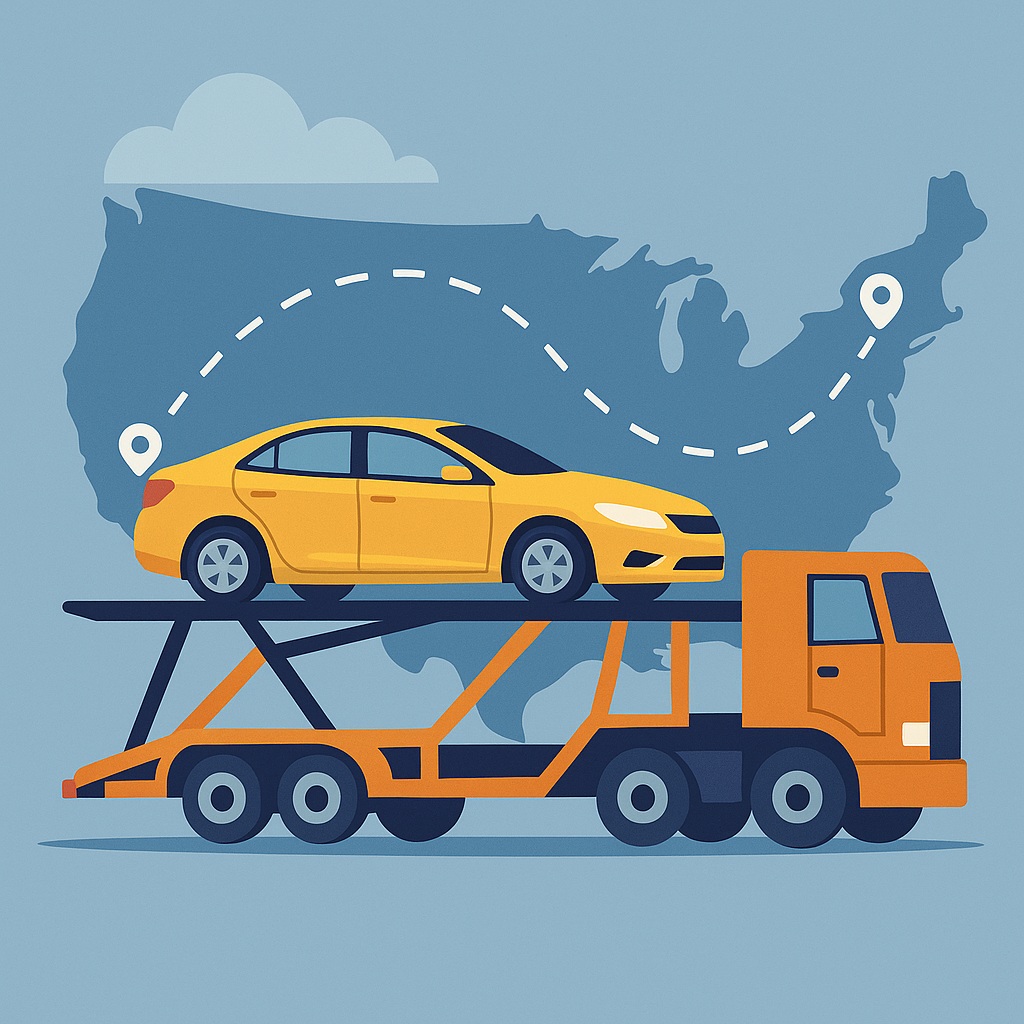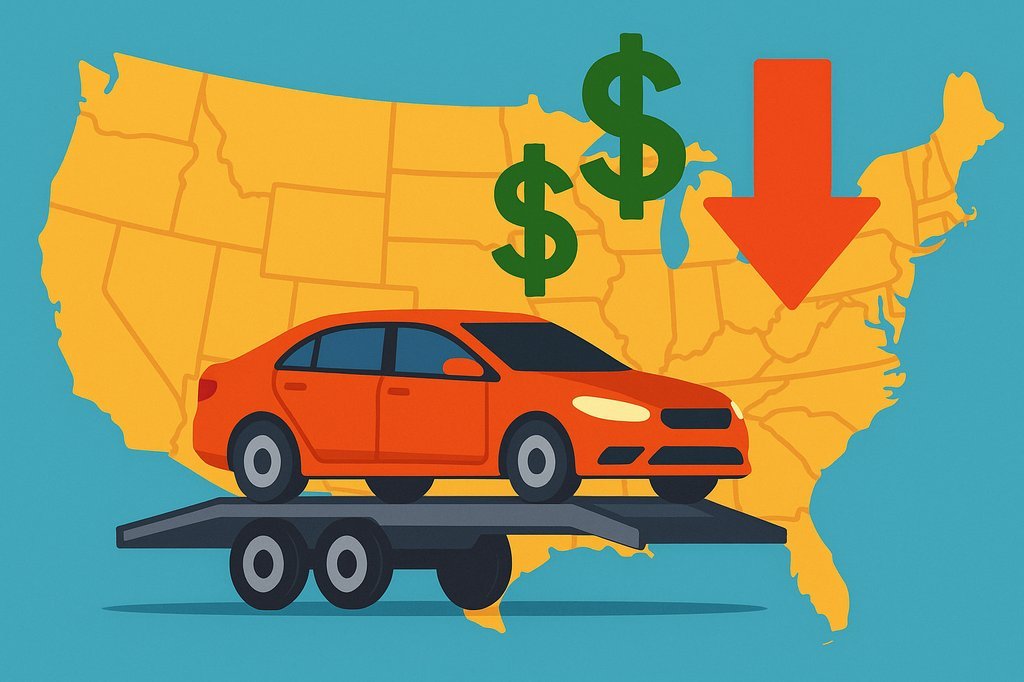People planning a cross-country move almost always start with the same question: what is the average cost to ship a car across the country? There is a range, not a single number. The total shifts with distance, the lane you are on, trailer type, vehicle size, and how tight your dates are. I move cars coast to coast year round, and the pattern is consistent. Long routes usually come out cheaper per mile than short ones, open trailers price lower than enclosed, and flexible pickup windows help carriers place your job on a route that is already rolling. Once those levers are clear, quotes stop feeling random and start making sense.
Before you chase numbers, decide how you want the vehicle hauled. Open service runs more departures and keeps the bill down. Enclosed brings protection for paint and trim and costs more. That single choice shapes almost everything else. If you want a quick refresher on what each service includes, this guide lays it out plainly: Vehicle transport options. With trailer style picked, the rest becomes timing, access, and paperwork.
Factors affecting car shipping quotes
Distance and lane demand. Cross-country jobs cover a lot of ground, but not all miles are equal. Popular lanes with steady traffic let drivers fill trailers efficiently, which trims your rate. Odd pairings or out-of-the-way towns take more planning and time off route. That shows up in the quote. It is not a penalty, just the reality of how rigs keep pace.
Trailer type. Open carriers move most vehicles and price on the friendly end of the spectrum. Enclosed fleets use lift gates or low-angle ramps, soft ties, and tight interiors. That equipment costs more to run and there are fewer units on the road, so rates are higher. If you are torn between the two, match the choice to paint condition, trim sensitivity, and your comfort level. The linked options page above helps you settle this early.
Vehicle footprint. A compact sedan takes less deck space and weighs less than a lifted SUV or a long truck. Height, length, and ground clearance change how a driver positions the car on the trailer. If your vehicle is oversized or modified, expect a different line on the quote. Electric vehicles, very low ground clearance, or winch-required inoperables also need planning. None of that blocks a shipment. It just changes how the driver sets the load.
Pickup and delivery access. Rigs like wide streets and clean turn-ins. Tight cul-de-sacs, low branches, stacked curb parking, and narrow apartment entries slow a day down. Drivers can work around it with a nearby lot, but that coordination costs minutes, and minutes are part of the math. Share a workable meeting spot during booking and you will often see a calmer number and a calmer day.
Season and timing. Summer, month ends, and snowbird shifts squeeze capacity. So do storms that push drivers off a lane. A flexible window lets dispatch drop your job onto a route that is already passing through. A guaranteed day or an expedited slot is possible, but you will pay for the priority.
Fuel, tolls, and insurance levels. These are background items, but they move quotes up or down over a season. You do not control them, yet they are worth knowing, especially if your timeline is flexible and you can book slightly ahead of a busy stretch.
If you want a step-by-step checklist that ties these factors into real prep, keep this on hand while you plan and pack: How to ship a car. It keeps the small items from stealing time on pickup day.
Price per mile for car shipping is where people try to make fast comparisons. On cross-country jobs, you will usually see the per-mile figure sit lower than it does on short hops, because all the fixed time gets spread across a lot of miles. Loading, inspections, weigh stations, traffic around big cities, fuel stops, and communication are present whether the route is 300 miles or 2,800 miles. When you divide those blocks of time over a long distance, the per-mile number calms down even though the total is higher.
Another angle on price per mile for car shipping is the lane itself. A major corridor with plenty of freight and passenger vehicles gives drivers more chances to fill open spots quickly. That efficiency shows up as a friendlier per-mile figure. Move the same distance across sparse towns and slower highways and the rate creeps up because the truck spends more time off route to reach you. If your town is out of the way, meeting at a nearby city or a wide highway exit can shave real dollars without adding much effort.
People often ask about car shipping rates and fees beyond the base number. The base covers the haul. Extras are tied to service choices or situations that change routing. Enclosed service is the big one. Guaranteed pickup windows, expedited placement, and after-hours handoffs add to the bill because they force dispatch to hold a slot or reshape a route. Top-deck requests on open trailers can carry a small premium in some cases. Storage at a yard appears if the car arrives well before you can meet it. Re-delivery shows up if the first handoff fails. These are not automatic line items. They only apply if you need them or if a plan changes late.
Payment methods and paperwork can affect how smoothly the number you agreed to stays the number you pay. This is still a practical trade. Some teams take a deposit and settle on delivery. Others collect in full at pickup. Many prefer certified checks at delivery, and some accept cards for deposits. Ask for all of this in writing, alongside the pickup window, delivery range, trailer type, and any storage or change rules. The cleanest savings come from a job that starts on time, loads in minutes, and hands off once without a second trip across town.
To lower the average without cutting corners, think like a dispatcher for a moment. Flexible windows, common lanes, easy access, and a car that is ready to load are the four levers you control. A quarter tank of fuel keeps weight down but still lets the driver shuffle positions if needed. Removing racks or antennas that sit higher than the roof line prevents surprises with clearances. An empty cabin and trunk keep the interior safe and avoid delays at pickup. That is the unglamorous work that protects time. Time is money on every lane.
If you are moving a high-value car, the discussion shifts. Enclosed equipment costs more, yet it often feels right when paint is fresh, trim is rare, or the car is a long-term keeper. Soft ties, padded interiors, and lift gates take the stress out of low noses and detailed finishes. When that is your situation, the average cost rises because the service is not the same. You can still trim the number with good access and a flexible window, but you are paying for protection and fewer variables. That is a fair trade for many owners.
Quotes that look too good deserve a closer read. If one line undercuts the others by a lot, check what is missing. Maybe there is no window at all. Maybe the last mile is not addressed. Maybe you call a voicemail when you want a driver update. I would rather take a middle quote from a team that shares a working phone number and puts terms in writing than chase a bargain that arrives late with a shrug. Calm days cost less in the end.
Last point. Keep your own records. Dated photos of each panel, roof, wheels, and interior taken after a quick wash remove question marks. They support a smooth handoff, and they are helpful if something needs attention later. The Bill of Lading will record condition at pickup and delivery. Your photos back it up and keep the conversation short if the day gets busy.
Cost to ship a car across country – FAQ
What is a realistic average for cross-country shipping?
There is a healthy range based on route and service. Open service with a standard sedan sits at the lower end on common lanes. Enclosed with a larger vehicle moves higher. Your lane, timing, and access will nudge the number. Pick a trailer style first using this overview: Vehicle transport options.
Why does a long trip cost less per mile than a short one?
Fixed time blocks do not shrink just because the drive is short. Loading, inspections, fuel stops, and traffic are still there. On long runs those blocks spread across more miles, so the per-mile figure dips even though the total is higher.
What is the cheapest way to keep the number down without risk?
Use open service if the vehicle does not need extra protection, give a flexible pickup window, meet at an easy access lot if your street is tight, and hand over a car that is ready to load. Those steps trim time and keep the quote steady.
Is enclosed always worth it for a cross-country trip?
Not always. For daily drivers, open is fine. For fresh paint, custom trim, or valuable classics, enclosed is a smart choice. Protection is the product in that case, not speed.
Do personal items inside the car change the price?
They can. Extra weight and loose objects create risk and delays. Many carriers decline items in the cabin and trunk. An empty interior keeps loading quick and avoids disputes.
What fees should I watch for on a coast-to-coast move?
Guaranteed pickup windows, expedited placement, top-deck requests, storage, re-delivery, and after-hours handoffs. None are automatic. Ask what is included in writing so you are not guessing at delivery.
How do I avoid last-minute surprises?
Share a workable meeting spot on both ends, keep your phone on, and confirm payment method early. A short note about low branches, gates, or tight turns saves time. If you are unsure on prep, use this checklist as a guide: How to ship a car.
Is a guaranteed hour realistic on a multi-day route?
Not really. You can buy a tight window, but exact hours collide with inspections, weather, and traffic. Plan a window and an alternate meeting spot. That is the professional way to keep a cross-country handoff smooth.
Can meeting the truck in a nearby city lower the rate?
Often, yes. If your town is far off route, meeting at a wide lot near a highway exit can reduce detours and help the driver keep schedule. Less time off lane tends to help your number.
Set your budget with the service that fits your car, give dispatch a workable window, and plan a handoff location the truck can reach. Do that and the average cost to ship a car across the country settles into a reasonable range without surprises chasing you at delivery.


